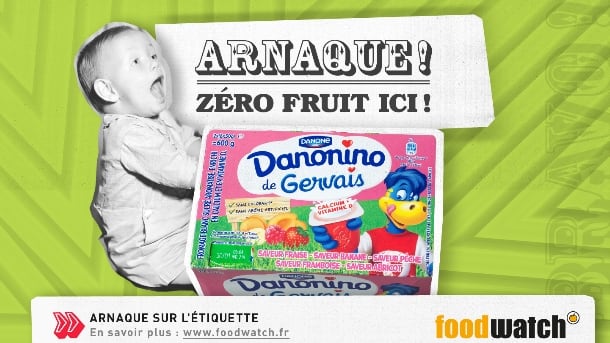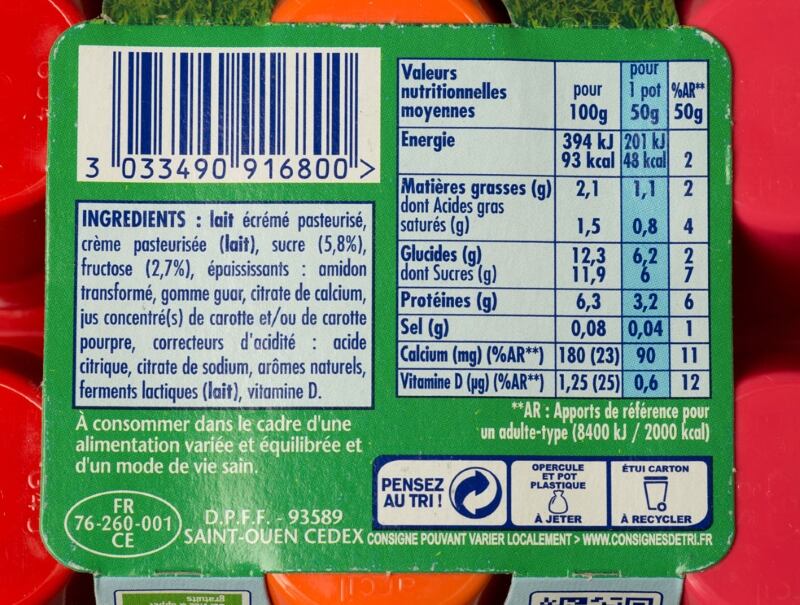The children’s snack comes in five flavors: strawberry, banana, peach, raspberry and apricot, with a picture of the fruit on the front.
foodwatch says European regulations and French laws are clear: it is forbidden to mislead the consumer.
Danone, however, disagrees its packaging is misleading.
A spokesperson for Danone told DairyReporter the company is “of the view that the information provided by Danonino packaging about the contents of this product is both fair and transparent vis-a-vis consumers.
“Our packaging is under no circumstances misleading and does not violate French or EU law. The representation of fruits printed on Danonino’s packs informs consumers about the flavor of the products they contain.”
Letter admits lack of fruit
In a letter to foodwatch shared with DairyReporter, Danone agreed it contains no fruit, but said the graphic and stylized representation informs the consumer about the taste of the products present. Danone added that the product also has a list of ingredients with detailed information.
foodwatch’s Ingrid Kragl told DairyReporter, “In their response letter, Danone confirms that Danonino does not contain any fruit. When asked what the exact composition of the flavors is, Danone replies that they are natural, even if they don’t necessarily come from fruits, but they do not specify what they are.”
foodwatch says it isn’t happy with Danone’s response, and launched a petition. In two days, the petition reached more than 5,200 signatures.
"Danone is one of the brands in which the French have the most confidence,” Kragl said.

“Yet Danonino's example shows that information on packaging is not transparent and even misleads consumers.
“The action targeting Danone that foodwatch France launched on March 1 is part of a broader campaign by foodwatch for several years,” Kragl said.
“It highlights the abusive practices on the labeling and/or composition of food products, informs the consumers, call the industry to change their practices and politicians to take measures to protect consumers’ rights for clear and transparent information on the food products.”
Change labels – or add fruit
Kragl is hopeful the issues can be resolved.
She said the first step, before any other action is taken, is the petition to simply ask Danone to change its packaging.
The petition asks for a change of labeling: either by withdrawing images and mentions of fruit – as the product does not contain any – or simply by including the fruit.
But Danone said it’s not misleading at all.
“Along with these images, our French packaging carries a clear mention of the word “flavor”, which is easily visible and appears right next to the illustration of the fruits,” the spokesperson said.
“In addition, the sales name is also very explicit: “flavored, sweetened fromage blanc, enriched with calcium and vitamin D”. Moreover, the list of ingredients reproduced on the packaging provides detailed information about all the ingredients used in the product.”

Also, Danone said interacting with its stakeholders and consumers is a priority in its daily work, and that it has proposed a meeting with foodwatch, but haven’t had a reply.
“As a matter of principle, we are very sensitive to consumers’ concerns and we regularly make changes to our products,” the Danone spokesperson said.
“In this respect, we are pursuing new formulations for Danonino. For instance, we launched one year ago a Danonino pouch with fruits.”
Labeling standards
Kragl said foodwatch has also written to the DGCCRF, the food control authority that is also in charge of consumers protection.
But Danone said there’s nothing wrong with the labeling under French law.
“This packaging fully complies with the provisions of AFNOR NF V 04-600 standard drawn up jointly by several stakeholders including consumer representatives and two French government entities, the Department of Consumer Affairs (DGCCRF) and the Food Department (DGAL).
“The main purpose of the AFNOR standard is to provide consumers with information they need. This type of packaging is used by most players on the market and meets the consumers’ expectations in terms of relevant information.”
Nutritional regulations
The European regulations on consumer information (INCO) and the French Consumer Code stipulate that the labeling of a foodstuff must not suggest the presence of an ingredient that is actually absent from the product, foodwatch said.
And Kragl said Danonino contains 11.9 grams of sugar per 100 g.
According to the WHO, marketing to children should not be permitted if this type of product exceeds 10g of total sugar per 100 g.
But Danone said it stresses that the total quantity of sugar present in Danonino partially comes from lactose, a sugar which is naturally present in milk and is 1.6 g less than the threshold established within the EU Pledge for advertising to children, which Danone has committed to respect.
“The formula of Danonino is developed taking into account an integral nutritional profile perspective that implies standards regarding level of proteins, calcium, vitamins as well as a maximum level of sugar defined in DANONE nutritional standards specific for children,” the spokesperson said.
Danone added “our company publishes its commitments to nutrition and that this product meets them in every way.”
About foodwatch
foodwatch is a non-governmental organization founded in 2002 by the former director of Greenpeace International, Thilo Bode. It has offices in Berlin, Amsterdam and Paris.
foodwatch exposes the legislative shortcomings and food industry practices that are detrimental to the interests of consumers. As a consumer rights organization, foodwatch is independent of governments and the food industry, and is financed through membership fees and donations.
